Table of Contents
What is Steel?
Steel is the most versatile commonly used structural material. The essential elements in steel are metallic iron and non-metallic carbon, with small quantities of other elements such as silicon, nickel, manganese, chromium and copper.
It is thus an alloy. Though steel is usually more than 90% iron, with other elements present in small quantities, these other elements have a pronounced effect on the properties of steel.
Unit Weight of Steel
Unit weight of steel or weight density of steel is the ratio of the weight of steel to its per unit volume. Usually, it is expressed in kilograms per cubic meter(kg/m3). The unit weight of steel is 7850 kg/m3 or 7.85 g/cm3 or 78.5 KN/m3 or 489.84 lb/ft3.
Before we move forward If you want free software to make bar bending schedule I highly recommend you download the official BBS app.
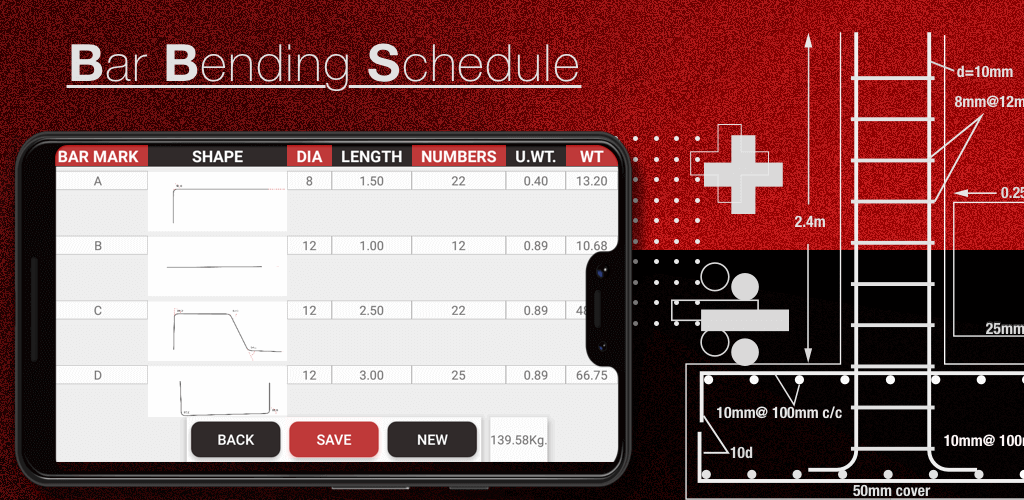
BBS App Google Play Link: Click here to download
Types of Steel
Depending upon the chemical composition, different types of steels are classified as:
- Mild Steel
- Medium Carbon Steel
- High Carbon Steel.
- Low Alloy Steel
- High Alloy Steel
Out of these, the first three types of steel are known as structural steel, commonly used in steel structures.
In Indian standard IS:800-1984(Code of practice for general construction in steel) is applicable to the types of structural steels covered by the following Indian Standard:
1. IS:226-1975 Structural Steel (Standard Quality)
2. IS:1977-1975 Structural Steel (Ordinary Quality)
3. IS:2062-1984 Weldable Structural Steel
4. IS:961-1975 Structural Steel (High Tensile)
5. IS:8500-1977 Weldable Structural Steel (medium and high strength qualities)
Steel conforming to IS: 226-1975 is suitable for all types of structures subjected to static, dynamic and cyclic loading, and is suitable for welding up to 20 mm thickness. The physical properties of mild steel are as under:
1. Density or Unit Weight of Steel – 7850 kg/m3
2. Youngs’s modulus of elasticity (E) – 2.04 x 105 Mpa (or N/mm2)
3. Modulus of Rigidity (G) – 0.785 x 105 Mpa (or N/mm2)
4. Poisson’s Ratio(µ) – 0.3 (inelastic rang)
5. Coefficient of thermal expansion or contraction – 12 x 10-6 per °C or 6.7 x 10-6 per °F
Also, read – Difference Between Mild steel and Stainless Steel
Various Steel Bars Diameters Used In Construction
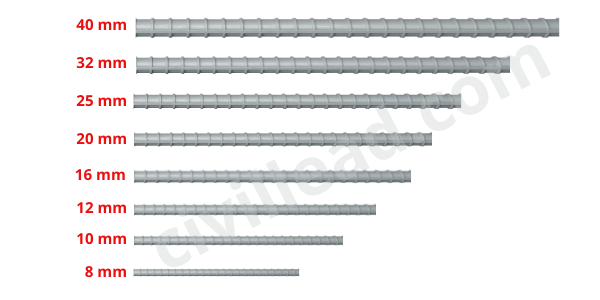
Different steel bar diameters are used in construction work, including 8mm, 10 mm, 12 mm, 16 mm, 20 mm, 25 mm, 32 mm, and 40 mm.
The steel bar diameter used for typical residential and commercial construction work varies from 8 mm to 25 mm.
Usually, 8 mm steel bars are used for stirrups for beams and columns and as a distribution bar for slab and other structural members.
The steel bar diameter greater than 8 mm is used as the main bar for different structural members like foundation, column, beam, etc.
Calculation of Weight of steel bar for 1-metre Length
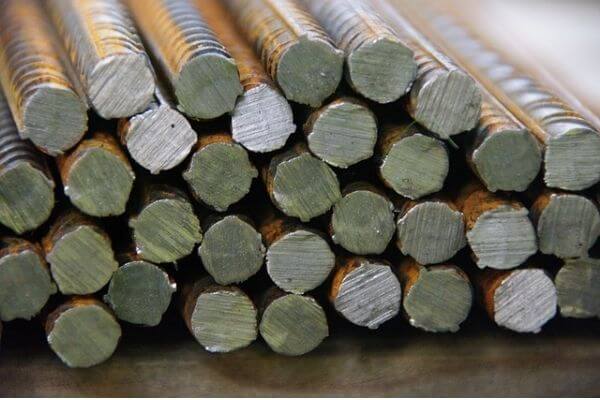
Weight = Density × Volume (Volume = Area x Length)
Example:- Diameter of Bar = 10 mm and Length = 1 metre
Area of circular bar = π/4 × d2
= 3.14/4 × 102
= 78.5 mm2
Volume = Area × Length
= 78.5 × 1000 (1 metre = 1000 mm)
= 78500 mm3
Unit Weight of steel bar for 10 mm = (7850/1000 ×1000 ×1000) × 78500
= 0.616 kg/m (1 kg/m3 = 0.000000001 kg/ mm3)
Similarly, we can calculate the unit weight of the square and rectangular bar.
Also, Read – How to Calculate Cutting Length of Stirrups for Beams and Columns
Derivation of Formula for Calculating Unit Weight of Steel
As we know the density of steel = 7850 kg/ m3
Weight of steel per metre = Volume × Density [ Volume = Area × Length ]
= π/4 x d2 × 1000 × 7850 kg/m3 (length = 1000 mm)
= 0.785 × d2 × 1000 × 7850 kg / (1000 × 1000 × 1000) [ 1 metre = 1000 mm ]
= 785 x d2 × 0.00000785
= d2/1 × 0.00616225 /1
= d2/1/0.00616225
= d2/162.27 ≈
= d2/162 kg/m (say)
So the Formula for unit weight of steel in kg/meter is = d2/162
Unit Weight of steel bar per feet = d2/(162.27 x 3.28084) ( 1 metre = 3.28084 feet)
= d2/532.38 ≈
= d2/533 (say)
= d2/533 kg/feet
Also, Read – What is Development Length? – Complete Guide
How do you Calculate the Unit Weight of Steel Bars?
With the help of the formula d²/162 (d is the diameter of the steel bar), we can calculate the unit weight of the steel bars, and it will give us weight in kg per meter. And the formula d²/533 will provide us with weight in kg per foot.
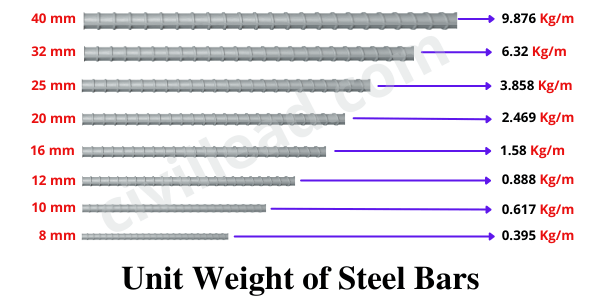
For 6 mm Diameter Steel Bar
Steel bar diamete = 6 mm, Steel bar length = 1 meter
Unit weight of 8 mm daimeter steel bar
= D²/162
= 6² /162
= 6×6/162
=36/162
= 0.222 kg/m
So the unit weight or weight per meter of the 6 mm diameter Steel bar is 0.222 kg/m
For 8 mm Diameter Steel Bar
Steel bar diamete = 8 mm, Steel bar length = 1 meter
Unit weight of 8 mm daimeter steel bar
= D²/162
= 8² /162
= 8×8/162
=64/162
= 0.395 kg/m
So the unit weight or weight per meter of the 8 mm diameter Steel bar is 0.395 kg/m
8mm diameter steel bar unit weight per feet = 0.12 kg/ft
For 10 mm diameter Steel Bar
Steel bar Diamete = 10 mm, Steel bar length = 1 m
Unit weight of 10 mm steel bar
= D²/162
= 10² /162
= 10×10/162
= 100/162
= 0.617 kg/m
The unit weight or weight per meter of the 10 mm diameter Steel bar is 0.617 kg/m.
For 12 mm Diameter Steel Bar
Steel Bar Diameter = 12 mm, Steel bar length = 1 m
Unit weight of 12 mm steel bar
= D²/162
= 12² /162
= 12×12/162
= 144/162
= 0.890 kg/m
The unit weight or weight per meter of the 12 mm diameter Steel bar is 0.888 kg/m.
For 16 mm Diameter Steel Bar
Steel bar diamete = 16 mm, Steel bar length = 1 m
Unit weight of 16 mm steel bar
= D²/162
= 16² /162
= 16×16/162
= 256/162
= 1.58 kg/m
The unit weight or weight per meter of the 16 mm diameter Steel bar is 1.58 kg/m.
For 20 mm Diameter Steel Bar
Steel Bar diameter = 20 mm, Length of Steel bar = 1 m
Unit weight of 20 mm steel bar
= D²/162
= 20² /162
= 20×20/162
=400/162
= 2.46 kg/m
The unit weight or weight per meter of the 20 mm diameter Steel bar is 2.469 kg/m.
For 25 mm Diameter Steel Bar
Steel bar diamete = 25 mm, Steel bar length = 1 m
Unit weight of 25 mm steel bar
= D²/162
= 25² /162
= 25×25/162
=625/162
= 3.85 kg/m
The unit weight or weight per meter of the 25 mm diameter Steel bar is 3.858 kg/m.
For 32 mm Diaameter Steel Bar
Steel bar diameter = 32 mm, Steel bar length = 1 m
Unit weight of 32 mm steel bar
= D²/162
= 32² /162
= 32×32/162
=1024/162
= 6.32 kg/m
The unit weight or weight per meter of the 32 mm diameter Steel bar is 6.32 kg/m.
For 40 mm Diameter Steel Bar
Steel bar diameter = 40 mm, Steel bar length = 1 m
Unit weight of 40 mm steel bar
= D²/162
= 40² /162
= 40×40/162
= 1600/162
= 9.87 kg/m
The unit weight or weight per meter of 40 mm diameter Steel bar is 9.876 kg/m.
Unit Weight of Steel Bars Per Metre Length
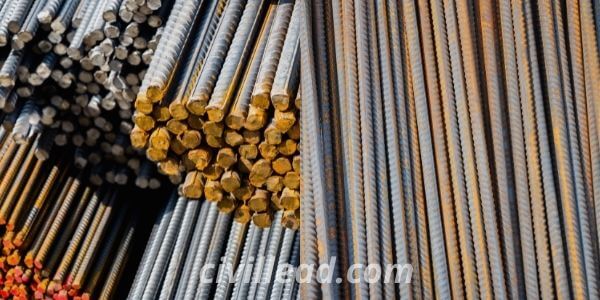
| S.No. | Dia of Bar (mm) | Weight of Bar Per Metre Length(D2/162) (Kg/m) |
|---|---|---|
| 1 | 8 | 0.395 |
| 2 | 10 | 0.619 |
| 3 | 12 | 0.888 |
| 4 | 16 | 1.58 |
| 5 | 20 | 2.469 |
| 6 | 25 | 1.388 |
| 7 | 32 | 6.32 |
| 8 | 40 | 9.87 |
Also, Read – What is Lap Length? How to Calculate it? – Complete Guide
Unit Weight of Steel Bar Per Feet Length
| S.No. | Dia of Bar (mm) | Weight of Bar Per Feet Length(D2/533) (Kg/feet) |
|---|---|---|
| 1 | 8 | 0.120 |
| 2 | 10 | 0.187 |
| 3 | 12 | 0.27 |
| 4 | 16 | 0.48 |
| 5 | 20 | 0.75 |
| 6 | 25 | 0.422 |
| 7 | 32 | 1.921 |
| 8 | 40 | 3.00 |
How to Calculate steel bar weight at the construction site?
For calculating the weight of steel bar at construction follows these simple steps.
- Identify the diameter of the bar
- Now count the numbers of bars of each diameter
- Now calculate the unit weight for each diameter steel bar available at the site.
Usually, each diameter steel bar comes at a 12-meter standard length. Hence you can calculate the steel weight by multiplying the total length of the bar with its unit weight for the respective diameter bar.
For Example, we have the following diameters of steel bars available at the site.
| Bar Diameter | Numbers |
|---|---|
| 8 mm | 12 |
| 10 mm | 15 |
| 12 mm | 18 |
| 16 mm | 10 |
| 20 mm | 8 |
| 25 mm | 6 |
Weight of 8 mm steel bar = Numbers of bar × Length × Unit weight
= 12 × 12 × 0.395 = 56.88 kg
Weight of 10 mm steel bar = Numbers of bar × Length × Unit weight
= 15 × 12 × 0.619 = 111.42 kg
Weight of 12 mm steel bar = Numbers of bar × Length × Unit weight
= 18 × 12 × 0.888 = 191.808 kg
Weight of 16 mm steel bar = Numbers of bar × Length × Unit weight
= 10 × 12 × 1.58 = 189.6 kg
Weight of 20 mm steel bar = Numbers of bar × Length × Unit weight
= 8 × 12 × 2.469 = 237.024 kg
Weight of 25 mm steel bar = Numbers of bar × Length × Unit weight
= 6 × 12 × 3.858 = 277.776 kg
Hence the total weight of steel available at the site = 1064.508 kg
FAQs
What is the Unit weight of Steel?
Unit weight or weight density of steel = 7850 kg/m3
How do you calculate the weight of steel?
Weight = Density × Volume (Volume = Area x Length)
Example:- Diameter of Bar = 10 mm and Length = 1 metre
Area of circular bar = π/4 × d2
= 3.14/4 × 102
= 78.5 mm2
Volume = Area × Length
= 78.5 × 1000 (1 metre = 1000 mm)
= 78500 mm3
Unit Weight of steel bar for 10 mm = (7850/1000 ×1000 ×1000) × 78500
= 0.616 kg/m (1 kg/m3 = 0.000000001 kg/ mm3)
What is the formula for weight calculation of steel bars?
The formula for weight calculation of steel bars = d2/162 kg/m
What is the weight of the 12 mm steel bar?
8 mm = 0.396 kg/m
10 mm = 0.619 kg/m
12 mm = 0.888 kg/m
16 mm = 1.58 kg/m
Thanks for reading this article. If you find this article helpful please, don’t forget to share it.
Also, Read
What is BBS ( Bar Bending Schedule)?
How to Calculate Quantity of Material For Plastering
Unit Weight of Building Materials Used In Construction
Difference Between Lap Length and Development Length
What is an Estimate? – Importance, Estimate of Building in Excel
What is BOQ? – Purpose, Importance, Advantage and Disadvantages
very good information sir
Thanks for your valuable feedback.
thank you sir
You’re welcome.
Sir,
One small typo mistake I observed in this document for the table Unit Weight of Steel Bar Per Feet Length, in the table it is typed Weight of Bar Per Metre Length(D2/533)
This may make confusion. Plz correct the typo error
Hi Santosh,
Thanks for reading the entire article and telling typing mistake. Now it has been updated.
Thanks!